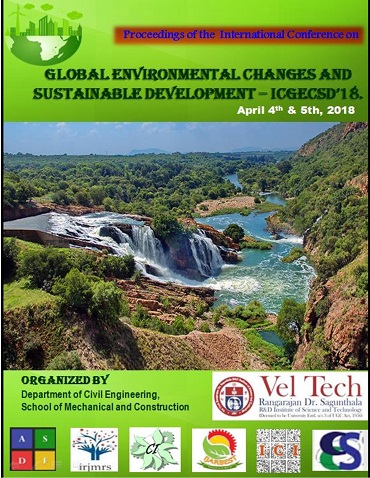- Publication Meta:Value
- Short Title:ICGECSD 2018
- Publisher:ASDF, India
- ISBN 13:978-81-933584-6-7
- ISBN 10:81-933584-6-5
- Language:English
- Type:Hard Bound - Printed Book
- Copyrights:ICGECSD Organizers / [email protected]
- Editor-in-Chief:Dr E B Perumal Pillai
- Conference Dates:04 - 05, April 2018
- Venue Country:Veltech R&D Institute of Science and Technology, Chennai, India
- Submitted Papers:230
- Acceptance Rate:8.12%
- Website:www.veltech.edu.in/icgecsd
Welcome to ASDF Electronic Digital Library!
ICGECSD 2018
ICGECSD 2018
International Conference on Global Environmental Changes and Sustainable Development 2018
Paper 045
Experimental Investigations on Partial Replacement of Cement Using Glass Powder
S Baskar1, Dr G Kumar2
1,2Assistant Professor, Department of Civil Engineering, School of Mechanical and Construction Engineering,
Vel Tech Rangarajan Dr. Sakunthala R & D Insititute of Science & Technology, Avadi, Chennai, India
Abstract
Concrete is a blend of cement, sand, coarse aggregate and water. The key factor that adds value to concrete is that it can be designed to withstand harshest environments significant role. Today global warming and environmental devastation have become manifest harms in recent years, concern about environmental issues, and a changeover from the mass-waste, mass-consumption, mass-production society of the past to a zero-emanation society is now viewed as significant. Normally glass does not harm the environment in any way because it does not give off pollutants, but it can harm humans as well as animals, if not dealt carefully and it is less friendly to environment because it is non-biodegradable. Thus, the development of new technologies has been required. The term glass contains several chemical diversities including soda-lime silicate glass, alkali-silicate glass and boro-silicate glass. To date, these types of glasses glass powder have been widely used in cement and aggregate mixture as pozzolana for civil works. The introduction of waste glass in cement will increase the alkali content in the cement. It also help in bricks and ceramic manufacture and it preserves raw materials, decreases energy consumption and volume of waste sent to land fill. As useful recycled materials, glasses and glass powder are mainly used in fields related to civil engineering, for example, in cement, as pozzolana (supplementary cementitious materials), and coarse aggregate. Their recycling ratio is close to 100%, and it is also used in concrete without adverse effects in concrete durability. Therefore, it is considered ideal for recycling. Recently, Glasses and its powder has been used as a construction material to decrease environmental problems.
Keywords
Author's Profile
Author profile can be generated and linked through our partners World Book of Researchers. To include your profile online Click Here. After it is approved, please email to edlib @ asdf.res.in to create a link with all the papers.
e-AID
ICGECSD.2018.045
Cite this Article as Follows
S Baskar, Dr G Kumar. Experimental Investigations on Partial Replacement of Cement Using Glass Powder. International Conference on Global Environmental Changes and Sustainable Development (2018): 45. Print.
© 2010 - by EDLIB .
All Rights Reserved.

